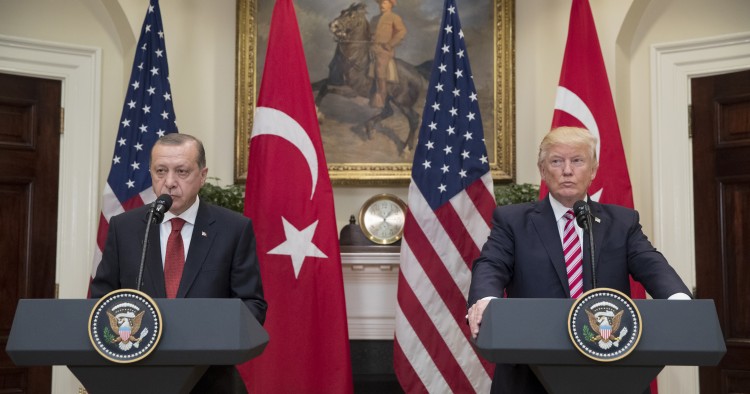This week, the Trump administration reimposed economic sanctions on Iran, targeting mainly financial transactions with and commercial airline sales to Iran. Tougher sanctions to stop the sale of Iranian gas and oil will go into effect in November. In a tweet, President Donald Trump issued a strong warning to those trading with Iran: “Anyone doing business with Iran will NOT be doing business with the United States." Its NATO ally Turkey is defiant. In a Jul. 24 roundtable with journalists, Turkish Foreign Minister Mevlut Cavusoglu said Turkey will not implement the U.S.’s unilateral sanctions on Iran.
Turkey and Iran are close trading partners. The trade volume between the two countries stands at $10 billion. President Recep Tayyip Erdogan wants to increase it to $30 billion. In an effort to boost commercial ties, the two countries enacted a preferential trade agreement in 2015, cutting tariffs on hundreds of products.
Turkey heavily depends on oil and natural gas supplies from its southern neighbor. In the first four months of this year, Turkey bought 3.077 million tons of crude oil from Iran, almost 55 percent of its total crude supplies. Natural gas imports from Iran account for 13 percent of Turkey’s total gas imports. The U.S. administration has granted an Iran sanctions waiver to the Southern Gas Corridor natural gas pipeline projects designed to carry Azeri gas from the Caspian Sea to Turkey and on to Europe. This means, as in the previous sanctions regime imposed by former president Barack Obama, that those gas imports are exempt from sanctions. But the sanctions that will take effect in November will affect a variety of other energy imports from Iran.
The sanctions under the Obama administration hit the Turkish economy hard. Turkish exports to Iran surged twelvefold until the U.S. and EU slapped new sanctions on Iran in 2011-12. After the sanctions, Turkish exports to Iran dropped, and Turkey had to reduce its crude imports from Iran by 20 percent. Many Turkish banks stopped processing payments from Iranian customers and the number of Iranians visiting Turkey tumbled. To evade U.S. sanctions, Turkey’s state-owned Halkbank, reportedly on orders from Erdogan, took part in a multibillion-dollar scheme that allowed Turkey to buy Iranian oil and gas in exchange for gold. The conviction of a senior banker at Halkbank on charges that he helped Iran dodge sanctions in a Manhattan court in January showed how far the Turkish government was willing to go to avoid the negative repercussions of the sanctions.
The 2015 nuclear deal with Iran was a sigh of relief for Ankara. But the reimposition of sanctions puts Turkey in a difficult spot. It comes at a time when the country is in the middle of a currency crisis. The Turkish lira has plunged sharply against the U.S. dollar. Inflation was already running high. The drop in the currency is pushing prices even higher. Experts say the country might be on the verge of a financial crisis. The economic effects of the sanctions will hurt the country’s struggling economy even more. Oil prices are likely to go up after the oil sanctions in November kick in, spelling further trouble for energy-hungry Turkey. Washington is telling Ankara to buy oil from Saudi Arabia instead of Iran, but that poses complications. Ankara has a pipeline with neighboring Iran. Buying oil from Saudi Arabia is more expensive due to transportation costs. Ankara also deems it strategically risky since relations between Turkey and Saudi Arabia are strained on a number of issues, including Turkey’s siding with Qatar in its feud with its fellow GCC member states.
Turkey is pressing the U.S. government for a waiver, but it might be tough to convince Washington to give concessions to Ankara at a time when relations are at an all-time low. The relationship has been strained over a number of issues, including Turkey’s decision to purchase a Russian missile defense system and U.S. cooperation with the People’s Protections Units (YPG), a Syrian Kurdish militia considered a terrorist organization by Ankara. Turkey’s decision to not release a North Carolina pastor jailed in Turkey since 2016 on trumped-up terrorism charges has been the straw that has broken the camel’s back. President Trump became furious when Turkey, instead of releasing him, moved the pastor to house arrest after months of negotiations between the two sides. In an unprecedented step, the U.S. treasury slapped sanctions on two Turkish ministers for their “leading role” in the arrest of the pastor. A Turkish delegation met with American officials yesterday to discuss the friction in relations. Iran sanctions were probably discussed but the delegation might have returned to Ankara empty-handed.
The U.S. action to sanction two Turkish ministers is an extraordinary rebuke to a NATO ally. If Turkey does not release the pastor, further sanctions will follow. If you think relations cannot get any worse, think again. Iran sanctions will complicate Turkey-U.S. relations even further.
Photo: Michael Reynolds-Pool/Getty Images
The Middle East Institute (MEI) is an independent, non-partisan, non-for-profit, educational organization. It does not engage in advocacy and its scholars’ opinions are their own. MEI welcomes financial donations, but retains sole editorial control over its work and its publications reflect only the authors’ views. For a listing of MEI donors, please click here.













